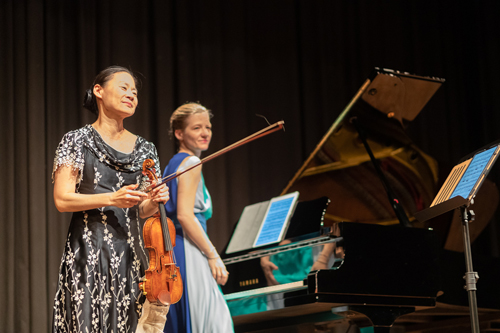Applause for thought?
It is a tricky task to say that something was exactly as good as it should have been – without this sounding like faint praise, at least. But such was the case with the Midori concert last week.
Having debuted with the New York Philharmonic aged 11, Midori (Gotoō) is an international leader in a crowded field, with additional credentials for her long-standing and widely-recognised commitment to charitable music-education. The purpose of this particular event was to inaugurate and raise funds for the Chamber Music Society’s Education Fund (of which she is Patron), not least through her donation of the concert itself: a gift of some considerable value.

A masterclass: Midori and Ieva Jokubaviciute. Pic by Kesara Ratnavibushana
Comprised of pieces by Brahms, Fauré and Debussy, there was a seasonal – if not strictly cyclical – feel to the programme.
They opened with a loosener of the ‘Sonatensatz’: thundery, with racing clouds, dispelled by outbreaks of golden summer sunshine – not unlike the elements round here these past few weeks. Midori’s violin had bite and punch, pursued by long, drawing melodies, while Ieva Jokubaviciute’s piano rumbled away always-slightly-ominously beneath.
Debussy’s gentler ‘Beau Soir’, literally a song about a beautiful evening (arr. by Jascha Heifetz), settled us into the more-contemplative, French end of things, which was to dominate the programme.
Then came the first of three sonatas (all ‘for violin and piano’), the heaving, roiling, blustery Northern European autumn of Fauré’s Sonata No.1 in A Major, in which the skittering, chatty third movement and the crashing waves of the allegro quasi presto were captivating highlights. (In this and each of the following major pieces it should be noted that Jokubaviciute was in every way an equal partner. This was no accompanist’s gig.)
Fauré’s wintry ‘Les Berceaux’, melancholic and lyrical (originally a song about abandoned wives and children), began the second half, indulged in all its mournful rall.s and rit.s. Then we were back into the warming (Eastern) sun of Debussy’s Sonata in G minor, the kaleidoscopic harmonies evocative of a late-spring river gathering in pace and power as it makes its progress to the sea (‘très animé’ indeed!), before we climbed back onto the tonal drier land of Brahms’ Sonata No.3 in D minor. The hammers rang down, the catgut snarled, the horsehairs broke: no hostages were taken.
Of the night’s three near-contemporary composers, the two Frenchmen are closer together in every sense than their German confrère (‘Kollege’, as Google Translate here assures me), and personally, I’d have preferred the Fauré and Debussy broken up a little by the Brahms, to ward off slight Impressionist fatigue.
But from the dark cellistic depths to the shimmeriest harmonics, Midori’s performance was a masterclass in poise and intricacy, and at a range that few are likely to experience too often.
To say that there was never a note out of place is, let alone being in the same ballpark, probably not even discussing the same sport.
It was, in short, world-class – and was followed, rightly, by a more-or-less complete standing ovation.
Sadly, as the continuing online scuttlebutt bears out, the excellence of Midori’s playing was not the chief thing many listeners came away with that night from the concert.
In a personal ‘Message’ in the programme Midori thanked Sri Lanka (ns) for the ‘beauty, enlightenment and excitement I have found here in the past’. But she may well be reconsidering that second item, now.
Despite the President of the CMSC, Lakshman Joseph de Saram, alternately imploring and instructing the audience to put away their phones, and the presence of unmissable print notices to the effect that no photography, videography or texting would be permitted… well, you know what’s coming.
No sooner had the performers left the stage after their first, short item (to let – ahem – late-comers in) than a recording of the paint-fresh ‘Sonatensatz’ played out across the auditorium. More phones rang as the performance went on, children were allowed to make egregious noise (bringing babies to such improving fare is probably a step too far in terms of educational ambition), and the blue haze of lit screens was routinely visible.
The jury’s not out on these issues. There is a standard and accepted etiquette, and distracting a world-class (or indeed any class) performer like this is inexcusable. Doing these things when you’ve been told not to only moments before borders on the insanely stupid/self-centred.
There’s also the small matter of your fellow concertgoers. (Though – in an education/outreach context, NB – the “Crucifixion’s too good for ‘em!” crowd might want to reflect that a few people enthusiastically applauding between sonata movements is neither a mortal insult nor as disruptive as a chorus of well-heeled music-lovers shushing piously in not-quite-unison.)
Nor should it be imagined that these infractions were coming only from the cheap seats. Perpetrators, frankly, should consider themselves lucky to escape without direct humiliation. (And to think some folk complain about ‘elites’.)
Midori had closed her gracious message ‘respectfully and in appreciation’. That respect, bluntly, was not reciprocated.
There was no encore.


